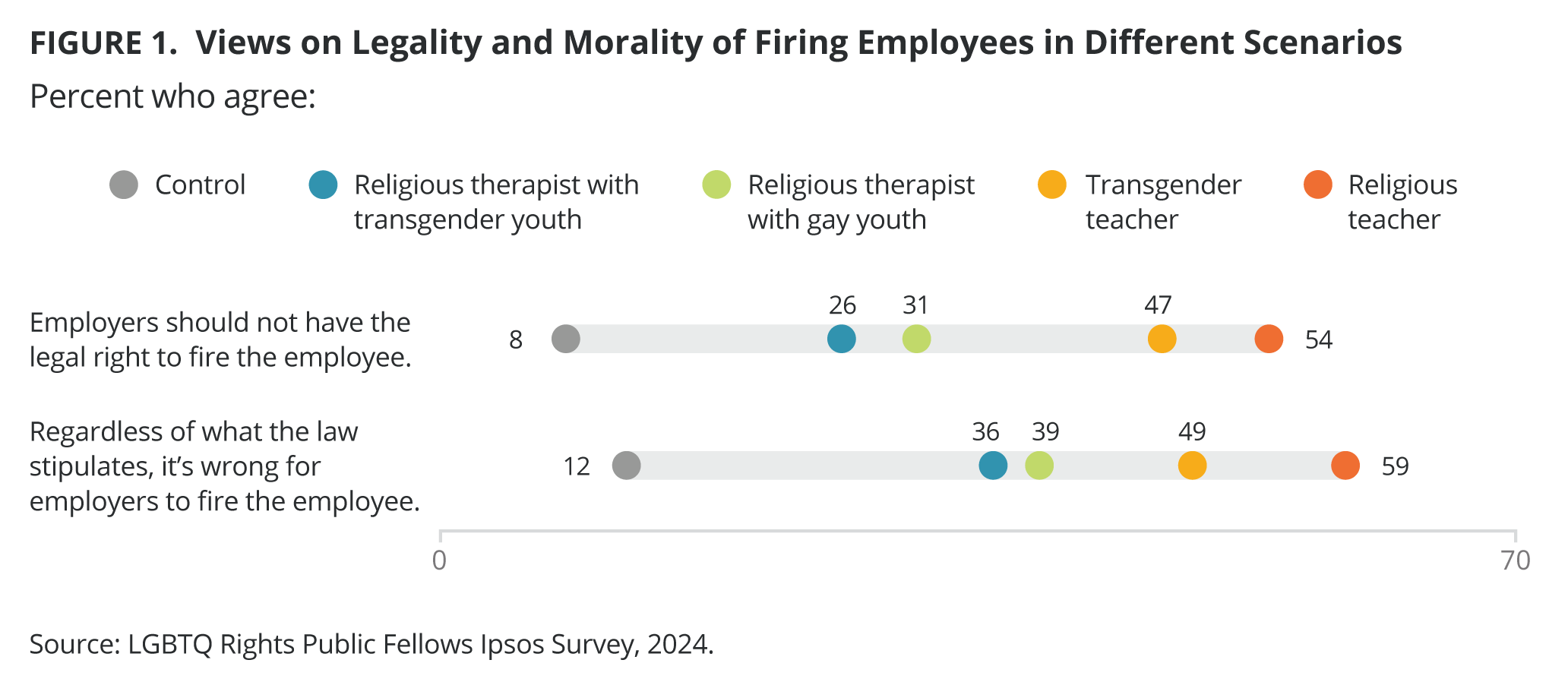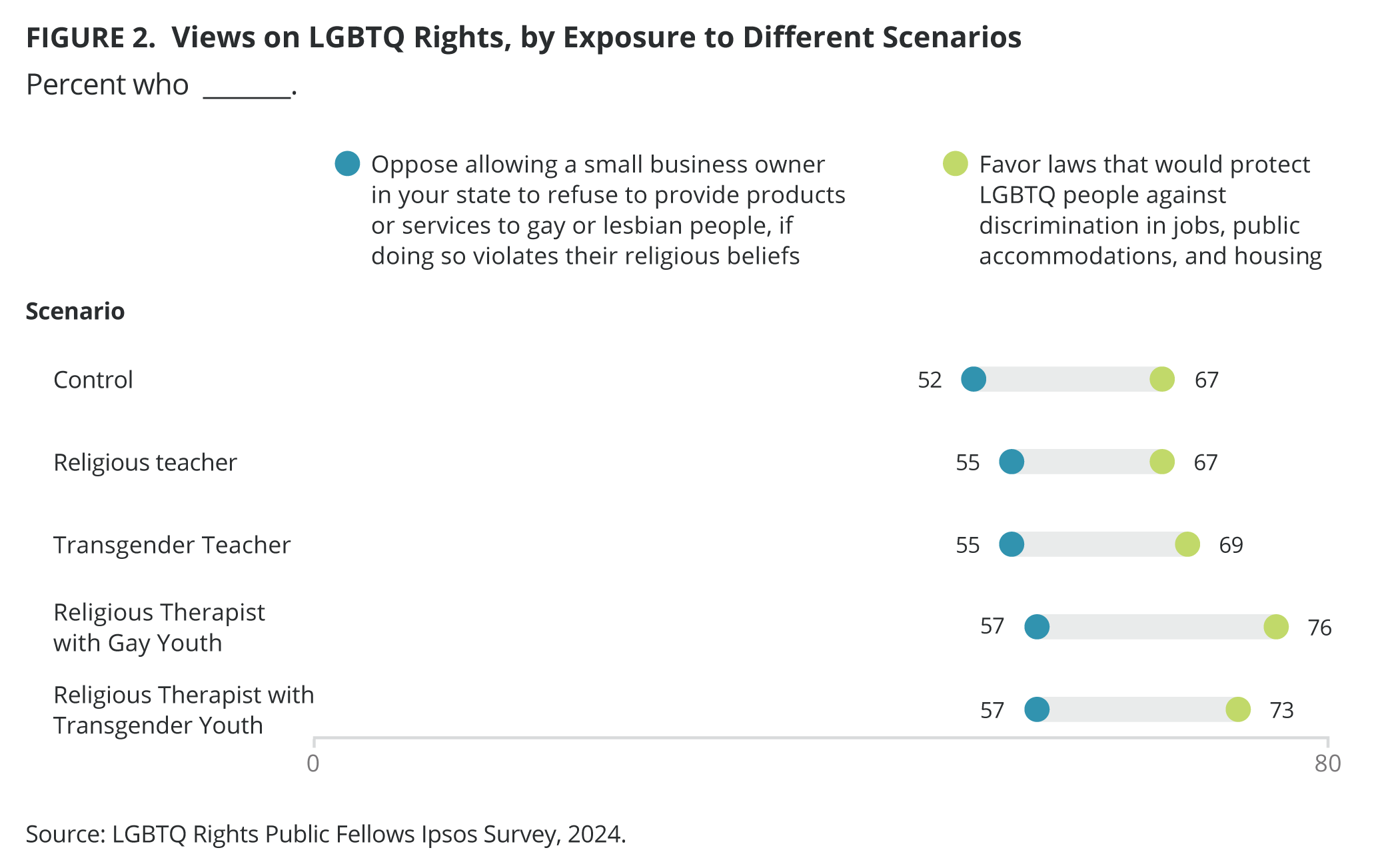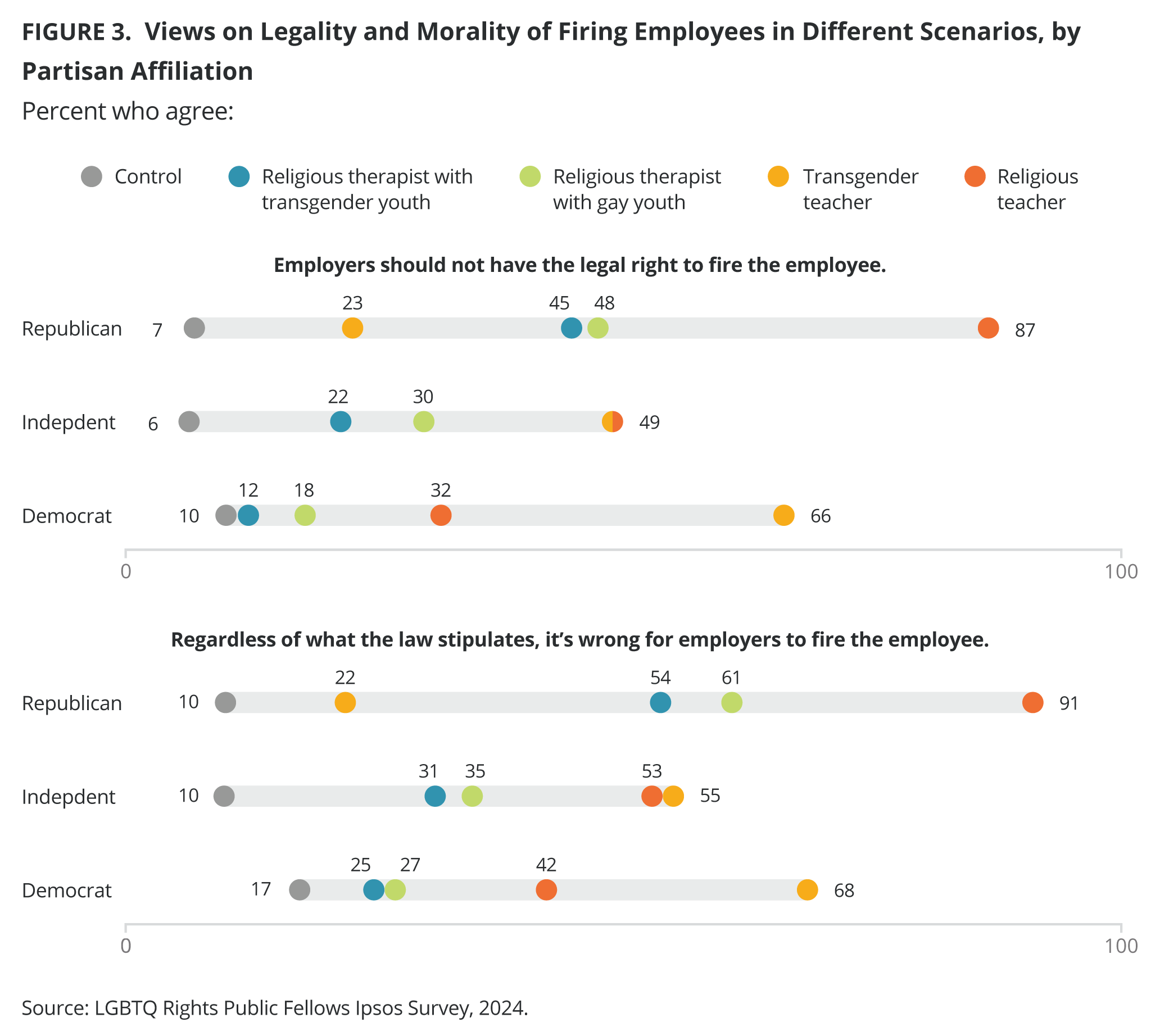Drs. Kelsy Burke, Andrew R. Flores, Suzanna Krivulskaya, and Joanna Wuest are 2023-2024 PRRI Public Fellows studying the intersection of politics, religion, and LGBTQ rights. This Spotlight Analysis details the findings of their original, collaborative research conducted with support from PRRI and American University, Washington, D.C.
In 2023, the U.S. Supreme Court announced its ruling in 303 Creative v. Elenis, declaring that a Christian business owner cannot be required to create wedding websites for gay couples because to do so would violate the free speech clause of the First Amendment. It was the latest in a series of Supreme Court decisions where conservative Christian merchants, employers, and social service providers argued that they should have the constitutionally protected right to refuse service to LGBTQ people. In lower courts, legal battles pitting religious rights against LGBTQ rights have involved a variety of arenas, including education, healthcare, marriage, adoption, foster care, and employment.
To better understand public opinion about recent legal cases involving religion and LGBTQ rights, PRRI and American University sponsored a nationally representative survey of over 1,000 American adults.[1] The survey asked respondents to react to a specific vignette involving a hypothetical scenario (inspired by real-life cases) where religious beliefs were in conflict with LGBTQ identity (see vignettes at the end of Spotlight).
Questions Based on Realistic Scenarios
The first three scenarios involve education. In Vignette 1, a high school math teacher is fired from a private religious school after coming out as transgender. In Vignette 2, a high school math teacher who is religious is fired from a private secular school after refusing to use the changed name and pronouns of a student who had recently come out as transgender. In Vignette 3, a high school math teacher is fired from a private secular school for being intoxicated (this is the vignette used as a basis for comparison).
The next two scenarios involve mental healthcare. In Vignette 4, a 14-year-old client seeks therapy after coming out to his parents as transgender. The parents of the child choose a Christian therapist who believes that gender transition is sinful. The therapist and parents agree to a therapeutic approach that will guide the client away from gender transition. This approach goes against the nondiscrimination policy of the private counseling practice where the therapist is employed, and she is fired. In Vignette 5, all details from the fourth vignette are replicated except that the client has come out as gay rather than transgender, and the therapist guides the client away from a “homosexual lifestyle.”

Findings from this survey suggest that Americans are largely split over whether a religious teacher who refuses to accommodate a transgender student and a transgender teacher at a private religious school may be legally fired. In both education scenarios, almost half agreed that the school should have the legal right to fire the teacher. In addition, 49% reported that they believed it would be “morally wrong” for the school to fire the transgender teacher, but a majority of 59% also reported this opinion in the case of the religious teacher who refused to use a transgender student’s new name.
For the vignettes involving mental health therapy, however, a clear majority of Americans believe that the private counseling practice should have the legal right to fire the religious therapist. We observed no statistically significant difference when it came to respondents’ reactions to a transgender client versus a gay client.
We also do not find statistically significant differences when comparing results tied to any specific vignette with responses to broader questions asked about LGBTQ rights. The current survey results largely mirrored recent PRRI findings (see Figure 2).

Statistically significant differences emerge when comparing our education scenarios to our control scenario (involving the teacher intoxicated at work). In this scenario, nearly nine in ten respondents agreed that this teacher should be fired. In comparison, Americans have significantly more sympathy for the individual rights of both the religious teacher and the transgender teacher.
Partisan Affiliation
Partisan differences present another stark pattern. About 87% of Republicans think the secular private school should not be able to fire the religious teacher, compared to 32% of Democrats. Yet only 23% of Republicans thought the school should not be able to fire the transgender teacher, compared to 66% of Democrats. However, political independents were almost evenly divided in their views on termination for both the religious teacher and the transgender teacher.

While recent public opinion studies provide general snapshots of public perceptions of LGBTQ issues and rights, surveys may gloss over some of the complexities presented in case law. Some cases, such as 303 Creative, involved plaintiffs who complained of hypothetical scenarios rather than actual events. These hypothetically-based cases frequently involve special interest groups, such as conservative Christian legal organizations, which facilitate litigation. It remains unclear whether the public would be as sympathetic toward plaintiffs if the American public learned that some litigants were recruited by outside organizations that seek to use religion to exempt people from nondiscrimination law.
| Vignette 1 | A high school math teacher is fired from Christ the Redeemer Academy (a private Christian school) after disclosing to administrators that he is transgender and would be changing his name, pronouns, and physical appearance. The teacher sues the school claiming unlawful termination because his status as a transgender person is unrelated to his performance as a math teacher. |
| Vignette 2 | A high school math teacher is fired from Great Pine Academy (a private but non-religious school) after refusing to use the changed name and pronouns for a student who recently disclosed to administrators that they were transgender and would be changing their name, pronouns, and physical appearance. The teacher sues the school claiming unlawful termination because of his sincerely held religious beliefs that God created only two sexes, male and female. |
| Vignette 3 | A high school math teacher is fired from Great Pine Academy (a private but non-religious school) after it was discovered that the teacher would come to teach while intoxicated and kept alcohol in his classroom. The school has a clear policy regarding no alcohol on campus. The teacher sues the school claiming unlawful termination because he has tenure and should have received a lesser punishment than termination. |
| Vignette 4 | A therapist has just started working with a 14-year-old client who told his parents that he is transgender. The client’s parents chose this therapist because she is a Christian who believes that gender transition is sinful. The therapist and parents agree to a therapeutic approach that will guide the client away from a gender transition and toward an acceptance of his assigned sex at birth. When the therapist shares her approach with her supervisor at the private counseling practice where she is employed, the supervisor informs her that the approach goes against the practice’s nondiscrimination policy regarding lesbian, gay, bisexual, and transgender (LGBT) people. The therapist ignores the supervisor and administers the therapy anyway, which results in her termination from the private counseling practice. The therapist sues her employer claiming unlawful termination because state law protects her right to freely practice her religion. |
| Vignette 5 | A therapist has just started working with a 14-year-old client who told his parents that he is gay. The client’s parents chose this therapist because she is a Christian who believes that homosexuality is sinful. The therapist and parents agree to a therapeutic approach that will help the client realize that his life will be best if he does not embrace a homosexual lifestyle. When the therapist shares her approach with her supervisor at the private counseling practice where she is employed, the supervisor terminates the therapist’s employment. The employer says that the therapist’s approach goes against the practice’s nondiscrimination policy regarding gay, lesbian, bisexual, and transgender (LGBT) people. The therapist ignores the supervisor and administers the therapy anyway, which results in her termination from the private counseling practice. The therapist sues her employer claiming unlawful termination because state law protects her right to freely practice her religion. |
[1] This survey of the American general population (ages 18+) was conducted by Ipsos using KnowledgePanel® to 1,017 respondents between May 31 and June 2, 2024. All results are weighted to provide representative statistics. The study was exempted by the American University Institutional Review Board.







